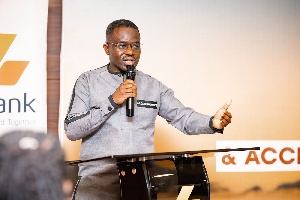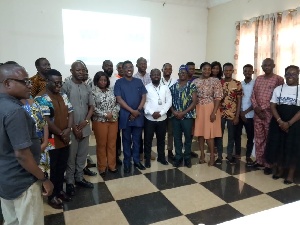Business News of Sunday, 20 April 2025
Source: www.ghanawebbers.com
Be ready to access markets by meeting required standards – Goosie Tanoh
Augustus ‘Goosie’ Tanoh, the Presidential Advisor on the 24-Hour Economy, spoke to Ghanaian exporters. He urged them to meet required standards to access markets.
Tanoh addressed the UK-Ghana Chamber of Commerce Forum at CalBank PLC’s Head Office. He noted that the international market is becoming more constricted. There are benefits for Ghana, but their duration is uncertain.
He expressed concerns about global trade uncertainty. This uncertainty may affect trade agreements like AGOA, which provides preferential access to the U.S. market for eligible sub-Saharan African countries. He also mentioned how relationships between the EU and MERCOSUR could impact Ghana's exports.
Tanoh emphasized that exporters should prepare for these uncertainties through the 24-Hour Economy program. He stated that being export competitive requires price competitiveness.
The program aims to enhance technology adaptation in industry. This will help improve quality and readiness for market penetration despite barriers.
Exporters should focus on goods where they have a natural competitive advantage, he advised. “These are what we need to pursue and incentivize,” he remarked.
The UKGCC organized this forum based on its 2024 Business Environment & Competitiveness Survey Report. The report was supported by the UK government's Jobs and Economic Transformation (JET) Programme and Palladium Group.
Eugene Sangmortey from the JET Programme spoke at the forum as well. He highlighted partnerships with various organizations to address business environment constraints in Ghana.
Their mission is to support economic transformation and create quality jobs in strategic sectors like textiles, agro-processing, pharmaceuticals, automotive, and light manufacturing. They aim to spur £120 million in investments and create at least seven thousand jobs.
The 24-Hour Economy Policy seeks economic transformation in Ghana. It aims to increase import self-reliance and reduce vulnerability to external shocks.
The policy also focuses on integrating value chains for better production quality and volume. It aims to optimize digitalization of resources for higher productivity and shared prosperity.
Abdul-Nasser Alidu from the Secretariat explained that optimizing productivity means using all available resources efficiently throughout each day.
The Secretariat plans seven sub-programs with private sector support to achieve its objectives. One key area is value chain financing programs aimed at reducing financial access barriers for businesses.
Alidu noted that high costs of finance hinder business growth in Ghana due to collateral requirements. The goal is a financing program that reduces costs by addressing structural problems identified earlier.
Tanoh stressed building transparency within the private sector as crucial for success. Transparency fosters trust necessary for a stable economy driven by private sector growth.
He mentioned raising funds to support private sector initiatives under this program would be essential. The protocols guiding it will be developed alongside private sector partners and lending institutions.
Mr. Alidu indicated that they are engaging development finance institutions in the UK for long-term financing support of this initiative.
Tanoh encouraged exploring Ghana as a viable market for UK growth opportunities. There are many areas where both nations can benefit from collaboration in agriculture and manufacturing sectors.
Steven Gray from United Kingdom Export Finance echoed this sentiment about shared history between both countries.
He revealed ongoing consultations regarding a new approach towards Africa by the UK government aimed at fostering equal partnerships rather than donor-recipient relationships.
Gray described this process as an exciting opportunity inviting feedback through the British High Commission in Accra.
The forum covered various topics related to operational principles of the 24-Hour Economy Secretariat, proposed institutional changes, foreign investor roles, and state institutions' involvement.
Tanoh answered questions from attendees regarding government efforts on manufacturing inflation reduction and improving exports within West Africa.
Participants urged tracking milestones for accountability while promoting homegrown equity funds investing in Ghana’s economy.











